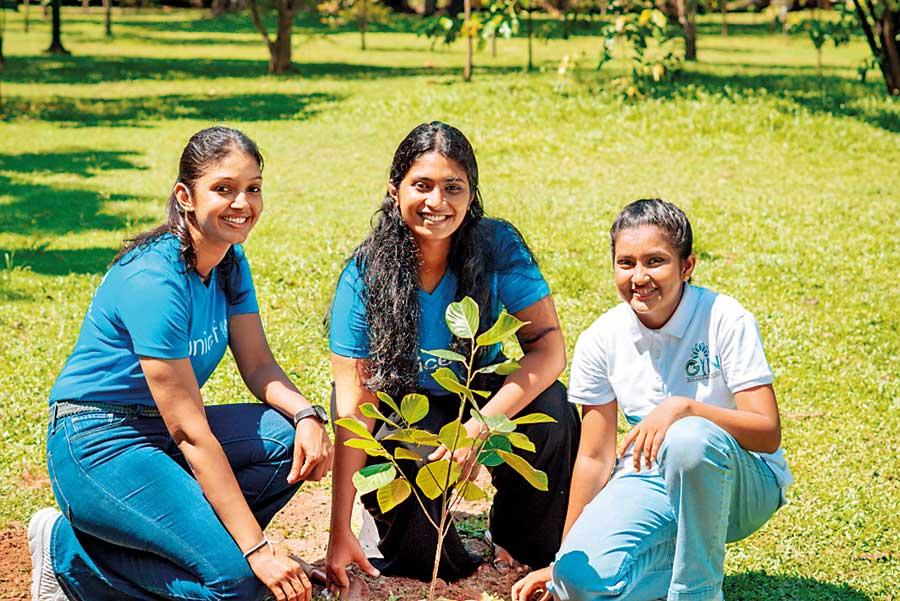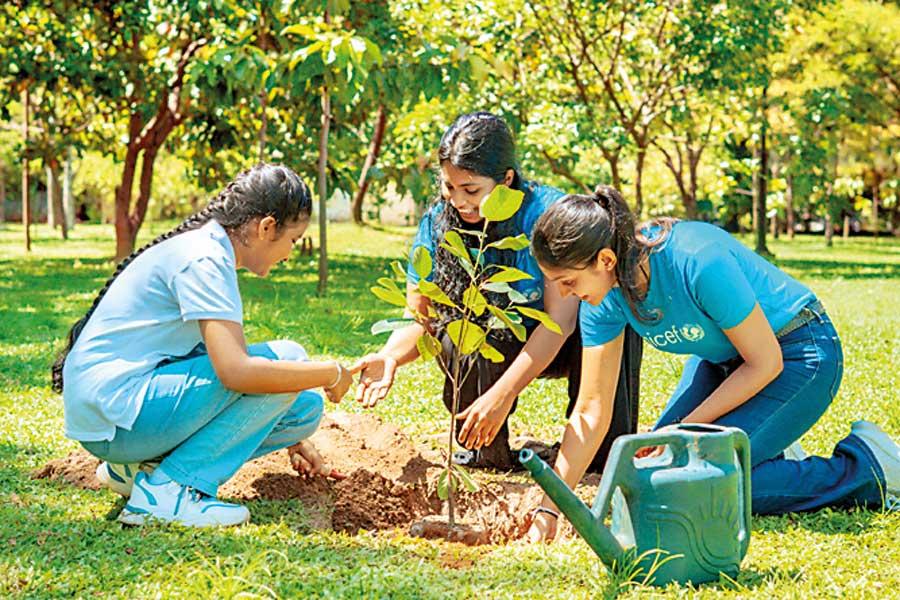22 Apr 2024 - {{hitsCtrl.values.hits}}

13-year-old Nulara charts course to plant 100,000 trees worldwide
It may take a few years before 13-year-old Nulara Ekanayake sees the jack trees she planted on the outer perimeter of the Viharamahadevi Park in Colombo grow large enough to bear fruit, but her hope is that at least by then more young people would have engaged in meaningful environmental initiatives, similar to her project to plant 100,000 trees worldwide.
perimeter of the Viharamahadevi Park in Colombo grow large enough to bear fruit, but her hope is that at least by then more young people would have engaged in meaningful environmental initiatives, similar to her project to plant 100,000 trees worldwide.
A case for the imperativeness of such initiatives, that also highlights the worsening effects of global warming, could be made simply by walking out of the shade of the park onto the pavement just outside, where direct exposure to the sun feels harsher than it ever has been.
The rising temperatures have been attributed to climate change, and while she can’t do much to reverse the inaction of those before her, Nulara does encourage young people to take even little steps that could positively impact the planet in the future.
“When I carry out my tree planting project I tell young people to switch off lights when they are not using it – we can do little things that will help a lot to mitigate the impact of climate change,” Nulara told the Daily Mirror.
Her efforts have been amplified and nurtured by the United Nations Children’s Fund (UNICEF) in Sri Lanka, for which climate change is a core area they are working on in promoting child rights.
Nulara’s ‘Grow and Glow with Nuli’ project is particularly significant in this regard, given that today is designated as the ‘Mother Earth Day’ by the United Nations.
It is evident that this cause is not a hobby or a mere fleeting interest for Nulara who first became interested in the environment at the age of seven.
Nulara’s ‘Grow and Glow with Nuli’ project is particularly significant in this regard, given that today is designated as the ‘Mother Earth Day’ by the United Nations
Poor children
“When I was 7 years old, I joined the Environment Society in school. The following year, I went to Wewugala, which is at Kurunegala. There are a lot of poor kids who don’t even have food to eat. At that time, I was really sad, but I was really small too,” Nulara, a student of Visakha Vidyalaya, Colombo said narrating her beginnings as an environmental enthusiast.
Her enthusiasm became an actionable project three years later, when as a 10-year-old, she won the Silver Award at the Royal Commonwealth Essay Competition.
“They invited me to join a World Schol Forum and there I had to initiate a project,” she recalled.
“Since I was an environment lover from a small age, I thought of doing a tree-planting project.”
The project has evolved to take on a bigger purpose and plan, with Nulara introducing a ‘3G concept’ to her tree planting.
“I have introduced a 3G concept which is Growing for Food, Growing for Habitats and Growing for Environmental Protection and up to now 7,206 trees have been planted,” Nulara says, adding that she has planted 5200 trees herself, having distributed a further 2000 trees for others to plant.
“I have distributed and planted mainly jack trees because it is a good tree for food. I chose jack trees because when I was 8, I saw poor kids who didn’t have food to eat,” Nulara explains.
And in trying to solve one environmental concern, Nulara says she discovered another problem that she has taken upon herself to address through a second project.
“Because I found lots of old plastic pens in some of the areas we dug holes in to plant trees, I started a second project. Many authorities have taken action for plastic bags, plastic bottles etc., but for pens, no action has been taken,” Nulara said.
“Together with a pen factory, I am collecting used pens and recycling them and giving back to students, professionals and university students.”
It shouldn’t come as much of a surprise then, if young Nulara was to soon become one of those children playing an active role in defining solutions that will bring about a better climate for the future of Sri Lanka
Rising temperatures
While the rising temperatures that the country is experiencing at the moment may be just a sweaty inconvenience to some at present, the long term impacts could be hardest felt by children, effectively making it a crisis that infringes on the rights of children including that of the right to food, water, healthcare and education.
“The climate crisis gets worse every day and it is children and young people who are the worst affected. It is also something that requires everybody to take action. For UNICEF, young people are a very big part of mobilizing action around climate, and young people like Nulara, who is doing tree planting and leading an environmental conservation programme is part of that action because everyone can do something to conserve the environment,” UNICEF Sri Lanka Chief of Communications, Partnerships and Advocacy, Bismarck Swangin told the Daily Mirror.
“UNICEF engages with several young people as well as other stakeholders to make sure that all of us can do what we can to make sure we are conserving the environment and responding to the risk that is created by the climate crisis.”
The vulnerability of Sri Lanka’s children to extreme changes in climate was underscored in 2021 when it ranked 61st out of 163 countries in UNICEF’s Climate Risk Index, which captures the exposure of children to multiple climate and environmental shocks and stress.
Climate crisis
“We are living with the worst effects of the climate crisis every day. There’s either too much rain, or there are high temperatures and heat waves, and in all these the survival of children is affected, including their growth and development. If there is flooding they can’t go to school; heat waves affect children the most because their bodies do not have enough fluids and adequate mechanisms to balance between the heat waves,” Swangin said.
This, Swangin emphasized, should put children at the heart of conversation about climate.
“It’s important that children are at the centre, first of all in the discussions that happen around climate. They should become aware, and they should be able to talk about how they are affected -- children and youth should be part of defining the problem, because they experience it first-hand, they are the worst affected -- and they should also be a part of defining the solution.”
It shouldn’t come as much of a surprise then, if young Nulara was to soon become one of those children playing an active role in defining solutions that will bring about a better climate for the future of Sri Lanka.

Nulara Ekanayake (in white) planting trees along with two UNICEF volunteers at the Viharamahadevi Park in Colombo
24 Nov 2024 3 hours ago
24 Nov 2024 3 hours ago
23 Nov 2024 23 Nov 2024
23 Nov 2024 23 Nov 2024
23 Nov 2024 23 Nov 2024